Although the tournament favourite was knocked out, Aronian and Grischuk’s tie-break was somewhat overshadowed by events in the other match. In fact, it turned out afterwards that the players had been disturbed by the “bam-bam-bam” of Kramnik and Radjabov playing blitz!
The match between Levon Aronian and Alexander Grischuk was also overshadowed in the sense that the live video cut away from their press conference to return to a game between Kramnik and Radjabov. Fortunately for us, however, there were Russian journalists present who recorded what was said. The quotes below are from Vladimir Barsky’s tie-break report at the Russian Chess Federation website. Yury Vasiliev also reported from the scene for ChessPro. Both reports are professional, entertaining, and also well-worth a look for the photographs (we’re spoiled by the live feed, but it’s also interesting to see different angles from time to time!).
Understandably, Aronian wasn’t in a particularly talkative mood (Radjabov has been the one great exception when it’s come to the losing quarter finalists), so it was Grischuk who went through the match. Note you can play through all four rapid games in a viewer at the end of this report:
Alexander Grischuk: Today’s tie-break was very tense. In the first game I managed to get a good, fighting position. Then Levon played very poorly (21. g4? was a very bad move). Afterwards White had chances of holding on, but he had to play b3 and a4. When I pushed b5 and a5 I had a big advantage. It’s a very difficult position to defend.
In the second game Levon used some brilliant preparation. I immediately got an extremely difficult position. Although another miracle almost occurred, it wasn’t quite enough.
I’ll interrupt here to mention that Grischuk’s play in what should have been a hopeless position was the absolute highlight of the tie-breaks for me. Anand once said of Grischuk’s time-trouble:
If I have only five minutes left on the clock, I start to get nervous. For Grischuk time trouble only begins when he has five seconds left. Before that he carefully writes the moves on his scoresheet, including minutes and seconds spent by each player – all that with unbelievable calm. Maybe he needs the thrill. At any rate he is an excellent blitz player. One must never underestimate him in time trouble.
We’ve probably never before had a chance to witness, in high-resolution close-up, how Grischuk handles his clock. Playing only on the ten-second increment he’d frequently let his time run down until a single second was left before darting out his hand to make the move and hit the clock (while Aronian maintained a comfortable 30 seconds or so). So if you missed it, I highly recommend watching the excellent replayable video feed from e.g. about 17:28:20 onwards.
Continuing with the press conference:
Grischuk: In the third game I again got an extremely difficult position. At one point, as Peter Svidler told me, Levon could have won very beautifully with: 31. Qc3! Nxd6 32. c6 Qc7 33. Re7!, and forking the two rooks.
But it’s impossible to criticise anyone for missing something like that. I somehow managed to draw, even more or less from a position of strength. It’s quite funny that it ended up being exactly the same position as in our third classical game, just with the colours reversed; identical!
In the fourth game Levon mixed things up. When White switches the knight to d3 via e1, with the rook still on f1, then in my view Black can’t play like that – 16…Bd8 and 17…Ra3, because of 18. b5!
Position after 19...Be7
After that I should have a big edge; perhaps on 19…Be7 you have to play not 20. Rfc1, but 20. Nb4. But after 20. Rfc1 Levon found the brilliant move 20…g5, after which things sharpened up. It’s hard to commentate on, as the position was very tense. Levon decided to give up his queen. Of course, there are drawing chances in that position, but given there are still a lot of pieces on the board the black king might come under attack. That is, in fact, what happened. Ultimately, the outcome of the match was decided by a blunder, but Black’s position was very unpleasant in any case.
The critical juncture in the final game after 19…Be7 attracted some interesting comment. Firstly, on the video feed I think it was Sergey Rublevsky who after White’s 20. Rfc1 noted that Black had no active plan – only for Aronian to find the incredible 20…g5!!? (with the threat of taking on c3 and forking on e4, though the computer would still take the pawn).
Vladimir Barsky writes of Grischuk’s suggested 20. Nb4, “the computer completely agrees with this recommendation and promises White a big advantage”, which is true, but when Sergey Shipov looked at the game in his video round-up of the tie-breaks he came to the conclusion that despite being up the exchange there’s no easy way for White to break through. When you press play the video below should start as Shipov’s about to show the position 20. Nb4 seems to lead to. (Of course you can also watch the rest of his analysis of the games – one point of interest is that he was far from sure Kramnik would have found the winning plan against Radjabov if that game hadn’t been stopped for the clock malfunction).
Levon Aronian: It ended up quite an interesting tie-break. Of course, in the first game I played terribly, as I did in the last, but in the second and third I was satisfied with my play, overall. Perhaps I didn’t quite cope with the pressure.
Yury Vasiliev asked Aronian what he could say about his opponent’s play:
Aronian: Sasha defended brilliantly both in the classical games and the rapid. He had a few very unpleasant positions, but he managed not to lose them.
The most interesting, or certainly controversial, point of the press conference, however, was when Grischuk raised the problem of him and Aronian having played their final rapid game to the accompaniment of Kramnik and Radjabov playing blitz.
Grischuk: I’d like to address this, above all, to the arbiters. You can’t do that: have some people still playing rapid chess while the others are going bam-bam-bam!
It disturbed me in the last game, and Levon as well: he winced, and Levon could see me wince. Of course, it’s a sound idea: that people who’ve taken 10 minutes to play a game don’t have to wait half an hour for the other pair. But the way things were done was also unacceptable.
We’re lucky to have an on-the-spot report by one of the arbiters, Alex McFarlane of Scotland, who was responsible for the Aronian-Grischuk tie-break and wrote about events afterwards in the Caledonian Mercury (it’s interesting that Grischuk didn’t bring up the clock incident, which must have added to the disturbance!):
My first game lasted longer than the other, so my second started ten minutes after the Kramnik–Radjabov one. However, they finished games two, three and four whilst I was still on game three.
It was decided to start my game four at the same time as the blitz game of the other competitors. As I was watching this game, I heard a bleep from the other clock, as when it is being reset. I looked round to see both players indicating the clock showing 00 and the other two arbiters moving swiftly towards the incident.
It was immediately decided that the game should continue with a replacement clock set at the times found either from the video footage or from the display of the games. There was some disturbance, though not excessive under the circumstances. It was certainly enough for me to consider halting my game, but not enough for me actually to do so. I was observed to request Kramnik to keep quiet during the incident. Does that sound like me? A picture published on ChessBase was captioned: “They discuss the situation, while arbiter Alex McFarlane admonishes them to keep it [the noise] down.”
It’s easy to imagine that if we have tie-breaks in future something will be done to avoid a similar problem, though of course for it to be an issue we’d need both the Kramnik-Grischuk and Kamsky-Gelfand semi-finals to end in ties.
You can follow how they start, as I’ll be translating Sergey Shipov’s commentary live today during the first game of the semi-finals. That starts at 15:00 local time (07:00 New York, 12:00 London, 13:00 Paris), and is here: http://www.chessintranslation.com/live-game/
In the viewer below you can play through all four rapid games from the Aronian – Grischuk tie-break:
Game viewer by Chess Tempo

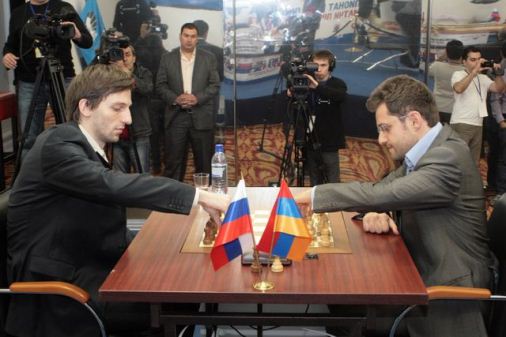

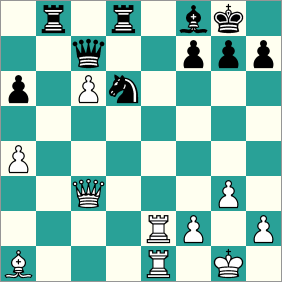
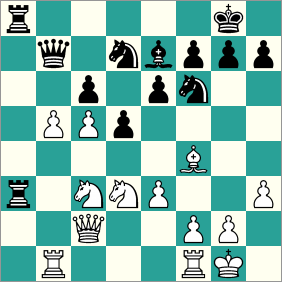
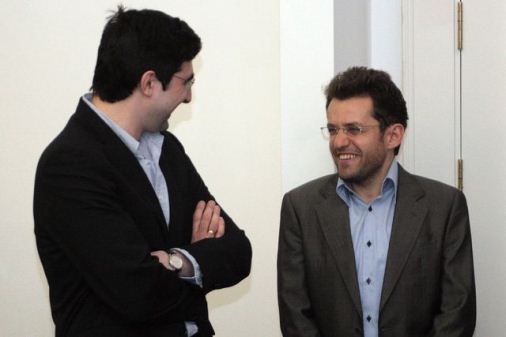
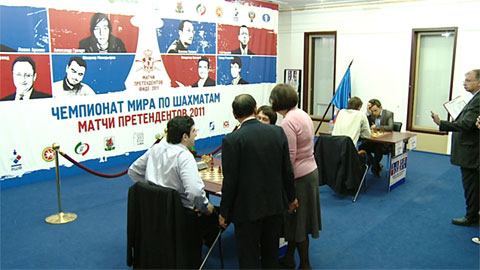

replace “Anand” by Aronian in intro to semifinal game.
Thanks! I might still have missed that even when I check it soon.
By the way, in answer to your question about translating the press conference – yes, I had to keep replaying it and try to catch every word! Not something I plan on doing again in the near future :) Though I’ll try and catch the gist. Actually, it gives you even more respect for the journalists present. It may be in Russian, but it’s no small matter to transcribe, select and rearrange what the players said in order to make a readable report!
thank you so much, mishanp, for all these great translation. It is very much appreciated.
You really spend many hours of work, collecting and splicing together this translation.
Thanks for the job!